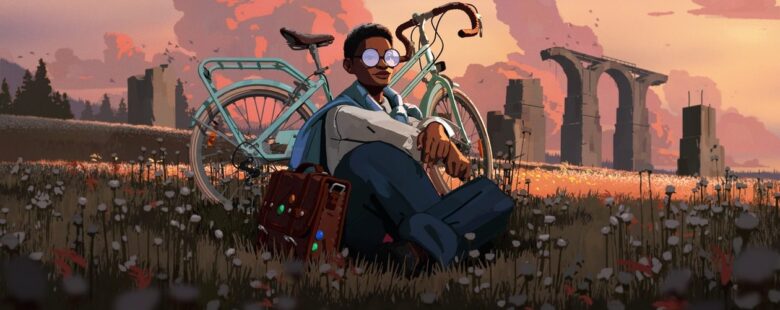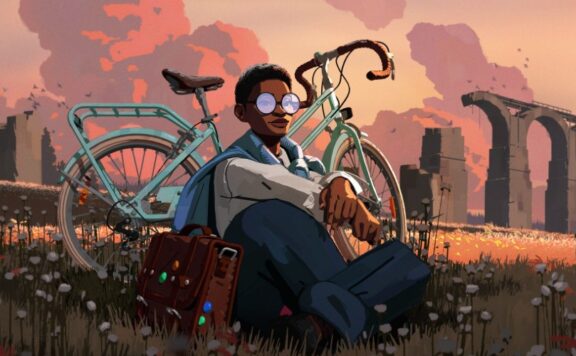Where do you head when the world is reaching the end of the road? It’s a question that any number of blockbuster movies and apocalyptic novels have tried to answer, often resulting in an explosive, guns-blazing, meteor-dropping spectacle that’s been designed to tickle adrenal glands the world over. Season: A letter to the future is not that kind of apocalyptic experience, instead approaching the topic in its fantastical land with solemnity, tenderness and a wistfulness that hearkens after the finest Japanese storytellers.
Scavengers Studios is based in Montreal, Canada, but the clearest touchstones for Season: A letter to the future are the quieter moments in Studio Ghibli or Madhouse animated films. There’s just something about the quiet approach to this particular end-of-the-world experience that asks for contemplation and compassion, where so many other studios might have thrown in a comet’s-worth of chaos.
You take the role of Estelle, a young woman venturing out from her secluded mountain village for the very first time. The season is coming to an end, and while there’s no clear explanation as to what length of time a season is, you learn that their end is punctuated by the demise of previous regimes, the rise of illness or a destructive war. Whatever the cause is, this current era is slowly giving way to what comes next, but in a plaintive, melancholy fashion. Estelle has decided to catalogue the world before it’s no longer in its current form, and set out on her bicycle, armed with a journal, a camera and a voice recorder, to capture this season’s final days.
Many people will check in purely based on Season’s sumptuous visuals, and regardless of anything else they won’t leave disappointed. Sweeping vistas, abandoned valleys and idiosyncratic settlements beg for you to explore and catalogue them. While the bicycle is a swift and characterful way to move about the world, you find yourself hopping off it every few seconds to capture another picture, whether it’s a particularly arresting sunset, or a cow, abandoned by its owner as they flee an impending flood.
It looks like an animated feature, but it retains a realness that adds to its charm and tone. This world unequivocally exists, and as you witness its passing, you’ll find it harder and harder to let it go.
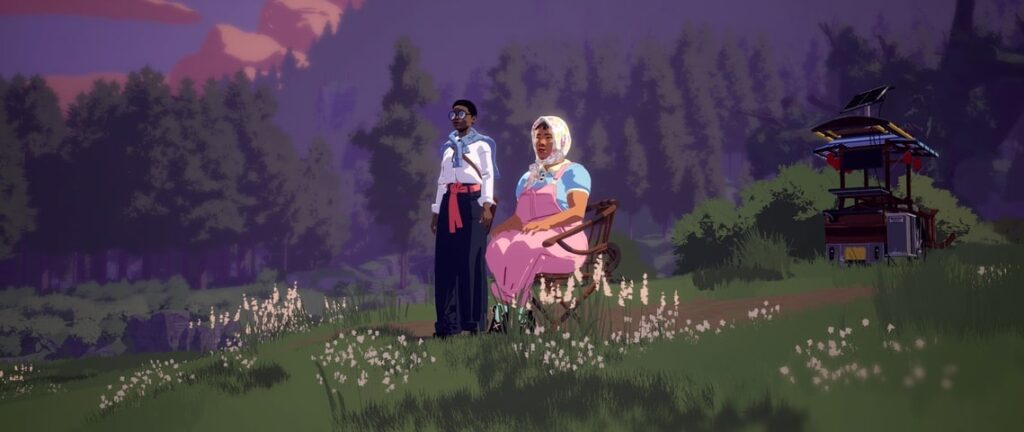
The audio design brings the world to life, though it’s largely through the elemental soundscape as opposed to a defined soundtrack. There are moments where music swells to bring a moment into fresh relief, but it’s the wind blowing, causing the grass and trees to ripple and rustle, the sound of your bicycle wheels spinning, or the river rushing beneath a bridge that is the true soundtrack to this journey.
The rare moments where you spend time in other people’s company are grounded by the quality of the voice acting, and it ensures that you’ll empathise for each and every person you meet. Their journeys, their memories, their lives; all of them feel personal to you, despite the off-kilter world.
Season presents you with any number of mysteries, but it doesn’t necessarily provide you with the answers to all of them. The populace suffering from some kind of memory-based affliction, the presence of dangerous psychoactive materials at points, and any number of other lesser questions about how someone could leave a farm’s worth of cows to drown, aren’t fully answered, or answered at all, leaving threads hanging for your imagination to fill in. It manages to straddle the line between satisfaction, substance and the imperceptible, and it’s carried through by your pensive wanderings.
Every area offers a number of opportunities for gathering information and material to stick into your journal, and it’s an intoxicatingly personal task, adding in your own pictures, audio and the central character’s discoveries and adding them to the page in whatever way you see fit. They can be a work of art in themselves, and gathering enough to ‘complete’ each area offers a little more insight into the world, or the character’s experience of it. It’s careful and it’s touching, light and gentle, without simply becoming meaningless or vapid.
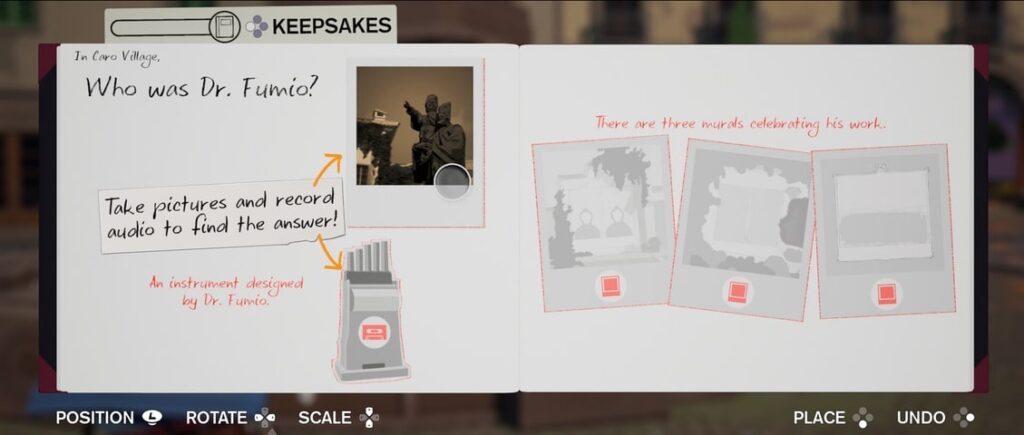
Memory is the central theme to Season, and it’s one that at times can become overwhelming, an idea that’s very much in tune with the game’s outlook. At points you come across memory flowers, the screen warping and rippling with their power. You can capture these memories with your voice recorder, reliving the past, but it’s clear that this could be a real danger to you if not for the pendant your mother gives you at the beginning.
It’s personally overwhelming as the player, and these moments are among the few times Season is harder to like. It’s purposeful, of course, showcasing how deeply affected the people here would have been, but you’ll be glad to cycle away after an encounter.
Season is telling you not to dwell on the past, not to become entwined with ghosts and spectres of events that have long ended, or to live too long in those relationships or situations that are coming to an end. It’s sympathetic and thoughtful, without a hint of awkward sentimentality, and few games manage to achieve that.
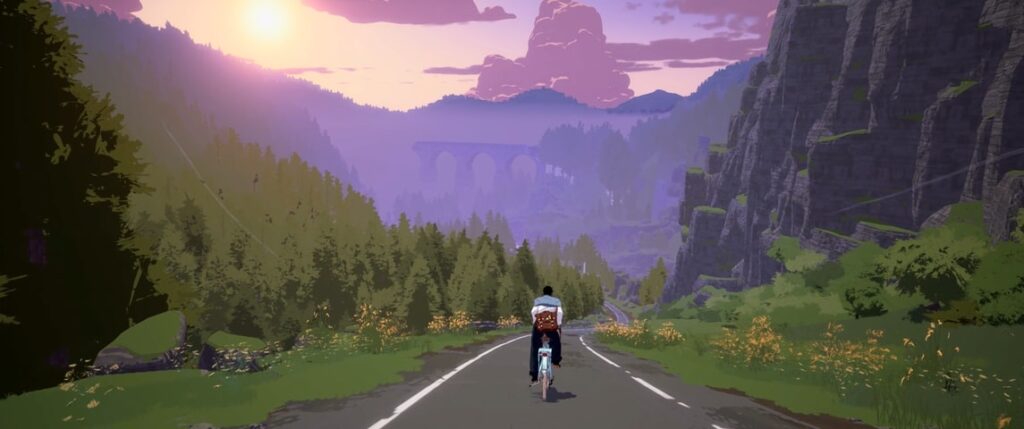
Occasionally, Estelle’s journey is let down by the mechanics of the game, though they’re never more than a mild annoyance. She’s not the fastest character on her own two feet, and she can sometimes feel like she’s gliding across the landscape rather than walking on it. Her bicycle, while considerably faster, can also be a bit of a brute to control, with sharp turns a task that’s considerably less enjoyable than hearing the spokes whirr. Estelle can also get stuck on some of the scenery, but all in all it’s a short-lived problem, and one that I’m more than willing to forgive.

